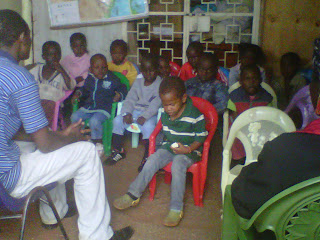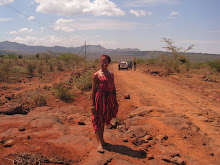 |
| A small section of our Garden. Planted by the non-gardener me:) |
 |
| Masai bracelets and Silly Bands |
Monday Morning: As the Nairobi sun beams through the Jacaranda trees it beckons me to be enveloped by its newness. Already my children are awake, getting dressed, playing and finding breakfast to eat (who ate all those chocolate chip cookies?). I say hello to the gardeners who help us to take care of the grounds and the animals and thank the guards who have worked all night while my dreams soared past the African sky. They say to me, “There is no difference between you and me. If I take you to my village they will say that you are my sister.” “I am your sister,” I think to myself as smile back and prepare for the day.
Saturday: We are going to the open market to buy our fruits and vegetables. We drive past several malls and many grocery stores on the way to the busy, mud floor bazaar. Perhaps it’s because we want the “African” rural experience that we venture where the trash looms outside and the monkeys are ever grateful for the abundance of food. Or maybe it’s because the produce is four times cheaper than the stores or maybe it’s because this is where Quincy can buy all of his exotic fruits and sprout the seeds later in preparation for his next project. Whatever the reason, we hold a certain romance with this place. Here we connect the faces to those who grow the food. Such a treasure was rare in our own consumerist, home culture. I see a monkey scamper by. The children ask for shillings to buy sugar cane and maze, “Ninatoka maze tadfathali,” Zahari says with a big grin on his face. He is quite proud of himself as he bites into the blackened, golden kernels.
 |
| Rift Valley |
 |
| Rural House in Limuru |
 |
| "Want to buy a chicken? I also slaughter it for you" |
 |
| "Look Mom I made a volcano!" |
 |
| More artwork made of clay |
 |
| Sunday School |
 |
| At the Market after the Christmas Play |
When Stars hide
When stars hide beneath the clouds those on earth can see
Cracked silhouettes, jagged edges fading glow-what once was brilliance.
When stars dangle in the ray of the sun their glow becomes what once was glory
Dangling in the beauty of a vast element, Venus is no longer the morning star.
When stars begin to wave across the blackened night with a trail of brightness we marvel at this wonder before us.
While we wonder and marvel, this star will quickly be no more.
What is this glimmering feature that hangs in the sky, encompassing rainbow’s blush?
While all of them light up the sky with midnight’s orchestra, only some starlight songs are called by name.
While thousands of illuminations dangle and dance along galaxy’s stage, the curtain of time will soon conclude this theatrical production.
By Joanne Ball-Burgess










No comments:
Post a Comment